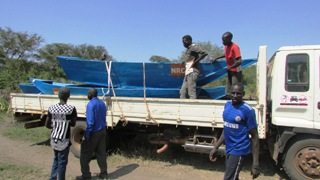FEATURE: Fishing industry financially supports Jonglei population
July 3, 2016 (BOR) – The quality of fish may not be of high standard due to the lack of refrigerators for preserving the huge catch, but local fishermen in South Sudan’s Jonglei state still earn good cash from their fish daily, which has improved their living standards.

James Achiek Dengic, a 39 year-old man from Jarwong in Malualchat of Bor told Sudan Tribune that he has, for now 20 years, been fishing for business. Although he never revealed how much he had saved in his traditional saving “hole” as referred to it, Achiek said he was able to buy an engine-powered boat, which ferries people to Lakes state.
The fishing business, he said, was one that does not require licensing from government. His father, for instance, never had any major economic activity other than fishing.
Acheik was born and raised up by parents who all belonged to the fishing community.
In his community, fishing sites are managed by local laws and orders passed and implemented by chiefs. The sites are open all times for anyone belonging to the community.
“Fishing is easy and free business each member of a community can do. It is quick rewarding with minimal loses all year round”, Achiek told Sudan Tribune.
Life style in the fishing camps has also proved to be better than that in the cattle camp.
South Sudan is a cattle-dominated economy, but this is changing slowly. Many cattle keepers are now changing their lifestyle by abandoning cattle keeping for fishing.
Akech Bol, a fisherman in Bor, said he abandoned cattle keeping for the fishing industry.
“With cattle, you go out every day to look after them in the grassing field. They, while there, you can be killed by people who come to steal or raid your cattle. Or you kill somebody who comes around. This way, our population get reduced day by day. That is the common problem we have in Jonglei,” said Akech.
“If you don’t want to be in the cattle camp, you cattle will not be taken care of by someone else properly, which is still another problem. This forced me to sale my few heads of cattle I had in 2010 and started fishing as my main economic activity. Today, I am a happy man with my eight children and two wives”, he added.
The fishermen live in small camps along the Nile River bank, some cultivate maize on the islands not commonly prone to flooding. They use various fishing tools, including gill nets, traps and in rear cases cast nets. Hooks and long lines are used in shallow tributaries.
Each morning, fishermen jump into their rowboats and sail to the siting site not always far from their residential place, and return before lunch with their catch.
The most common types of fish caught include, Cat fish, Gymnarchus, Heterotis, Tilapia, Distichodus and Citharinus.
Each day he goes out, Akech says, he sells his fish to fish vendors who come to the docking site near his village. He doesn’t have to sail or walk or pay transport cost to Bor town for marketing. But his profit margin isn’t good compared to his labour cost.
For the last five years he had been fishing, he managed to pay school fees for his children in Uganda, and use the rest of the money to feed his dependents at home. He spends any amount of money that remains to buy goats, which he said are easy to manage.
Currently, he has more than 20 goats he keeps at home, a good sign of his pride as a man.
The United States Agency for International Development (USAID) supported them with fishing nets and gears, and boats, and technical ways of fish preservation, through Catholic Relief Service (CRS), Oxfarm, HDC among others.
The preservative plating of the fish is used then sun dried. One plated thread contains five to 10 fish, depending on the type and size of each constituent. Such a thread is prized upto 250 South Sudanese pounds ($6 at the current rate) in the local market.
(ST)
